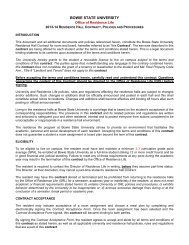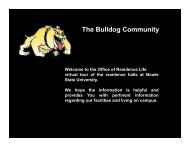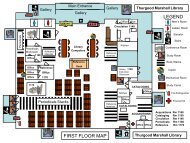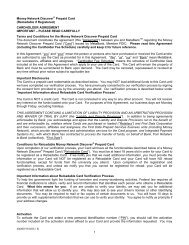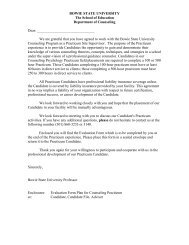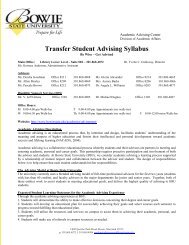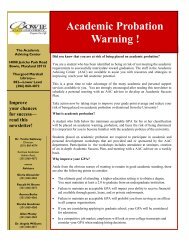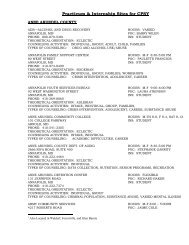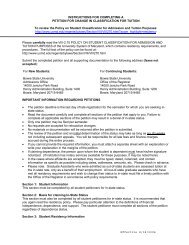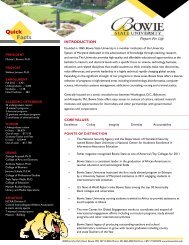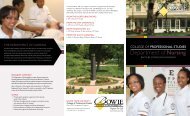- Page 2 and 3:
HISTORY Bowie State University is a
- Page 4 and 5:
Eastern Shore; University of the Di
- Page 6 and 7:
MEMBERSHIPS American Association fo
- Page 8 and 9:
Charlotte B. Robinson Hall was orig
- Page 10 and 11:
Bowie State University Office of th
- Page 12 and 13:
SUMMER SESSION 2010 Session I June
- Page 14 and 15:
National Alumni Board of Directors
- Page 16 and 17:
Donald Kiah, M.Ed. Assistant Vice P
- Page 18 and 19:
Rhonda Jeter‐Twilley, Ph.D. Chair
- Page 20 and 21:
Joan Langdon, Ph.D. Professor of Co
- Page 22 and 23:
Sidney Walker, Ph.D. Assistant Prof
- Page 24 and 25:
Diarra O. Robertson, Ph.D. Assistan
- Page 26 and 27:
Cubie A. Bragg, Ph.D. Associate Pro
- Page 28 and 29:
Barbara Jackson, Ph.D. Assistant Pr
- Page 30 and 31:
Jesse H. Ingram, Ph.D. Professor of
- Page 32 and 33:
Aly Mansour, Ed.D. Lecturer of Mana
- Page 34 and 35:
curriculum, and such other evidence
- Page 36 and 37:
P.O. Box 92970 Milwaukee, WI 53202
- Page 38 and 39:
RESIDENCY POLICY (VIII‐2.70 Appro
- Page 40 and 41:
C. The student shall notify the ins
- Page 42 and 43:
Successful and harmonious articulat
- Page 44 and 45:
for admission may vary by program,
- Page 46 and 47:
Program Articulation A. Recommended
- Page 48 and 49:
The receiving institution must resp
- Page 50 and 51:
Advanced Undergraduate Standing 1.
- Page 52 and 53:
Engineering Lower‐level courses a
- Page 54 and 55:
the Chair of the Department of Teac
- Page 56 and 57:
The University does not participate
- Page 58 and 59:
58 2009‐2010 Undergraduate Catalo
- Page 60 and 61:
hospital costs, laboratory tests, a
- Page 62 and 63:
FINANCIAL AID LOCATION Henry Admini
- Page 64 and 65:
adjustments to financial aid. The O
- Page 66 and 67:
The general eligibility requirement
- Page 68 and 69:
Direct Loan Aggregate Loan Limits C
- Page 70 and 71:
C. PROCEDURE For financial aid purp
- Page 72 and 73:
Default Management Policy Default i
- Page 74 and 75:
STUDENT CODE OF CONDUCT Students ar
- Page 76 and 77:
Alpha Phi Alpha Fraternity, Inc. Al
- Page 78 and 79:
History & Government Organization T
- Page 80 and 81:
Phi Alpha Honor Society On April 21
- Page 82 and 83:
Zeta Phi Beta Sorority, Inc. The Ze
- Page 84 and 85:
STUDENT LIFE AND ACADEMIC SUPPORT S
- Page 86 and 87:
Programs and Special Events Directo
- Page 88 and 89:
completed their English composition
- Page 90 and 91:
We also provide supportive counseli
- Page 92 and 93:
The Office of Campus Safety publish
- Page 94 and 95:
career transitions, and academic gr
- Page 96 and 97:
The Portfolio Counselor will assist
- Page 98 and 99:
UNIVERSITY HONORS PROGRAM Director:
- Page 100 and 101:
MILITARY SCIENCE Chair: LTC Thurint
- Page 102 and 103:
College Park, Md 20742‐4321 (301)
- Page 104 and 105:
In 2003, the Office assumed respons
- Page 106 and 107:
1. Students may add, drop, or chang
- Page 108 and 109:
A student who wishes to withdraw fr
- Page 110 and 111:
400‐499 Primarily for Seniors 500
- Page 112 and 113:
1. The student must initially consu
- Page 114 and 115:
When there has been a discontinuati
- Page 116 and 117:
Students must submit official copie
- Page 118 and 119:
First/Second Semesters College Span
- Page 120 and 121:
Bowie State University awards credi
- Page 122 and 123:
assessment and are, therefore, requ
- Page 124 and 125:
• Generally, schools must have wr
- Page 126 and 127:
GENERAL EDUCATION AND INSTITUTIONAL
- Page 128 and 129:
Total General Education Requirement
- Page 130 and 131:
DEPARTMENT OF COMMUNICATIONS MAJOR
- Page 132 and 133:
BROADCAST JOURNALISM SAMPLE PROGRAM
- Page 134 and 135:
Selected Electives 21 semester hour
- Page 136 and 137:
Selected Electives 24 Semester hour
- Page 138 and 139:
Selected Electives 38 semester hour
- Page 140 and 141:
DEPARTMENT OF COMPUTER SCIENCE MAJO
- Page 142 and 143:
programs are also available to our
- Page 144 and 145:
HEED 102 Life and Health 3 HEED 200
- Page 146 and 147:
3. Recognition of general types of
- Page 148 and 149:
FRSE 101 Freshman Seminar 3 Freshma
- Page 150 and 151:
DEPARTMENT OF ENGLISH AND MODERN LA
- Page 152 and 153:
Technology (3 semester hours—one
- Page 154 and 155:
SOPHOMORE YEAR First Semester FREN
- Page 156 and 157:
FREN 101 First‐Year French I or S
- Page 158 and 159:
SOPHOMORE YEAR First Semester ENGL
- Page 160 and 161:
SOPHOMORE YEAR First Semester ENGL
- Page 162 and 163:
LITERATURE OF THE AFRICAN DIASPORA
- Page 164 and 165:
DEPARTMENT OF FINE AND PERFORMING A
- Page 166 and 167:
ENGL 101 Expository Writing 3 ENGL
- Page 168 and 169:
• museums and galleries • arts
- Page 170 and 171:
culture and museum‐related studie
- Page 172 and 173:
ART 110 Introduction to Drawing 3 A
- Page 174 and 175:
ART 210 PRINTMAKING I or ART 211 3
- Page 176 and 177:
their creative work and in various
- Page 178 and 179:
TRANSFER STUDENTS Transfer students
- Page 180 and 181:
Art History Requirements (4 courses
- Page 182 and 183:
13 Art/VCDMA/Seminar V (required) S
- Page 184 and 185:
All instrumentalists will be requir
- Page 186 and 187:
SOCI ___ Social Sciences Elective 3
- Page 188 and 189:
Proficiencies A student must demons
- Page 190 and 191:
MUSA 409 Seminar 0 ____ ___ Music E
- Page 192 and 193:
sequence with workstations, compute
- Page 194 and 195:
Senior Project Guidelines There are
- Page 196 and 197:
COSC 111 Computer Literacy 3 MATH 1
- Page 198 and 199:
Second Semester PHSC 100 Physical S
- Page 200 and 201:
Second Semester THEA 202 Play Produ
- Page 202 and 203:
either the history or the governmen
- Page 204 and 205:
GENERAL HISTORY SEQUENCE The Genera
- Page 206 and 207:
SOPHMORE YEAR First Semester HIST 1
- Page 208 and 209:
PROFESSIONAL EDUCATION REQUIREMENTS
- Page 210 and 211:
e taken sequentially and in accorda
- Page 212 and 213:
First Semester HIST 111 World Civil
- Page 214 and 215:
GOVT 317 US Constitutional Law and
- Page 216 and 217:
8. To assist the University in achi
- Page 218 and 219:
*Note: Mathematics Education majors
- Page 220 and 221:
2. To provide a versatile and broad
- Page 222 and 223:
MATH 450 Overview of College Mathem
- Page 224 and 225:
First Semester MATH 430 Advanced Ca
- Page 226 and 227:
SPED 403 Orientation to Special Edu
- Page 228 and 229:
Bowie State University/Howard Unive
- Page 230 and 231:
MATH 320 Introduction to Number The
- Page 232 and 233:
BACHELOR OF SCIENCE BIOLOGY The Dep
- Page 234 and 235:
Students are encouraged to take sum
- Page 236 and 237:
ii) Completion of requirements for
- Page 238 and 239:
SCIENCE EDUCATION A science educati
- Page 240 and 241:
English Composition (6 semester hou
- Page 242 and 243:
CHEMISTRY EDUCATION CONCENTRATION S
- Page 244 and 245:
HIST 114 African‐American History
- Page 246 and 247:
successfully pass the Bowie State U
- Page 248 and 249:
DEPARTMENT OF ACCOUNTING, FINANCE A
- Page 250 and 251:
ENGL PROF English Proficiency 0 15
- Page 252 and 253: SOPHOMORE YEAR First Semester ACCT
- Page 254 and 255: Second Semester ENGL 102 Argument a
- Page 256 and 257: DEPARTMENT OF MANAGEMENT INFORMATIO
- Page 258 and 259: Second Semester ACCT 212 Principles
- Page 260 and 261: Students are expected to familiariz
- Page 262 and 263: BUSINESS ADMINISTRATION MINOR (18 s
- Page 264 and 265: ____ ___ Science Elective II 4 PHIL
- Page 266 and 267: Second Semester ACCT 212 Principles
- Page 268 and 269: ECON 211 Principles of Macroeconomi
- Page 270 and 271: SOPHOMORE YEAR First Semester ACCT
- Page 272 and 273: SCHOOL OF EDUCATION Dean: Traki Tay
- Page 274 and 275: DEPARTMENT OF TEACHING, LEARNING AN
- Page 276 and 277: a. Specialty Area (SA) is a graduat
- Page 278 and 279: ENGL 102 Argument and Research 3 Ar
- Page 280 and 281: EDUC 314 Assessment for Reading Ins
- Page 282 and 283: Technology (3 semester hours) COSC
- Page 284 and 285: SECONDARY TEACHING PROGRAM Secondar
- Page 286 and 287: PHIL 101/103 Intro. To Philosophy/P
- Page 288 and 289: DEPARTMENT OF BEHAVIORAL SCIENCES A
- Page 290 and 291: PEDO 424 Field I and Seminar I 6 PE
- Page 292 and 293: Majors are required to earn at leas
- Page 294 and 295: SOCIOLOGY (B.A. or B.S.) SAMPLE PRO
- Page 296 and 297: Social and Behavioral Sciences (6 s
- Page 298 and 299: JUNIOR YEAR First Semester SOCI 305
- Page 300 and 301: Public Administration BUAD 315 Intr
- Page 304 and 305: Fall NURS 406/ 409 NURS 415/ 416 ID
- Page 306 and 307: Year Four Fall Spring Course Title
- Page 308 and 309: General Policies Academic Honesty a
- Page 310 and 311: Student Advisement - All students m
- Page 312 and 313: Clinical/practicum Clinical courses
- Page 314 and 315: Women 1. All skirts or dresses must
- Page 316 and 317: Bowie State University Bowie, Maryl
- Page 318 and 319: DEPARTMENT OF PSYCHOLOGY MAJOR CONC
- Page 320 and 321: Arts and Humanities (6 semester hou
- Page 322 and 323: PSYC 202 Psychology of Learning 3 P
- Page 324 and 325: PSYC 200 Introduction to Psychopath
- Page 326 and 327: 1. Prepare graduates as competent e
- Page 328 and 329: Technology (3 semester hours) COSC
- Page 330 and 331: SOWK 305 Social Work with Children
- Page 332 and 333: SOCI 409 Urban Problems 3 SOWK 300
- Page 334 and 335: ANTH 305 ANTHROPOLOGICAL THEORY (Pe
- Page 336 and 337: ART 470 SELF PROMOTION & MKGT FOR T
- Page 338 and 339: ART 396 2D DIGITAL ANIMATION I: INT
- Page 340 and 341: BIOL 311 HUM ANAT & PHYSLGY I (Fall
- Page 342 and 343: BUIS 461 TELECOMM FOR BUSINESS (Fal
- Page 344 and 345: COMM 242 SURVEY OF EMERGING MEDIA (
- Page 346 and 347: COMM 437 PRACTICUM 3 CREDITS This c
- Page 348 and 349: COSC 473 ARTIFICIAL INTELLIGENCE (F
- Page 350 and 351: CTEC 340 MULTIMEDIA APPLICATION DEV
- Page 352 and 353:
ECON 212 PRIN OF MICROECONOMICS (Fa
- Page 354 and 355:
EDUC 102 PRACTICUM I 1 CREDIT This
- Page 356 and 357:
skills and to continue their growth
- Page 358 and 359:
ENGL 346 INTRODUCTION TO GENERAL LI
- Page 360 and 361:
ENGL 470 METHODS OF TEACHING ENGLIS
- Page 362 and 363:
GOVT 215 POLITICAL GEOGRAPHY (SPRIN
- Page 364 and 365:
HIST 114 AFRICAN‐AMERICAN HISTORY
- Page 366 and 367:
IDIS: COURSE DESCRIPTIONS IDIS 201
- Page 368 and 369:
MATH 232 MULTIVARIABLE CALCULUS 4 C
- Page 370 and 371:
MATH 496 PUTNAM MATH 1 CREDIT Prere
- Page 372 and 373:
MISC: MILITARY SCIENCE COURSE DESCR
- Page 374 and 375:
MUSA: APPLIED MUSIC COURSE DESCRIPT
- Page 376 and 377:
MUSA 191,192,291,292,391,392,491,49
- Page 378 and 379:
MUSC 356 FORM & ANALYSIS (Spring On
- Page 380 and 381:
evidence‐based practice in clinic
- Page 382 and 383:
health sciences to expand their und
- Page 384 and 385:
PHED 190 ELEMENTARY ACTIVITIES 1 CR
- Page 386 and 387:
PHYS 301 QUANTUM MECHANICS (Periodi
- Page 388 and 389:
PSYC 441 PRACTICUM IN PSYCHOLOGY (F
- Page 390 and 391:
education, and community facilities
- Page 392 and 393:
SPAN 202 SECOND‐YEAR SPANISH II (
- Page 394 and 395:
SPM 405 ORGANIZATION AND ADM OF SPO
- Page 396 and 397:
THEA 259 AP DANCE TECHNIQUE 3 CREDI
- Page 398:
THEA 420 CHOREOGRAPHY II 3 CREDITS




